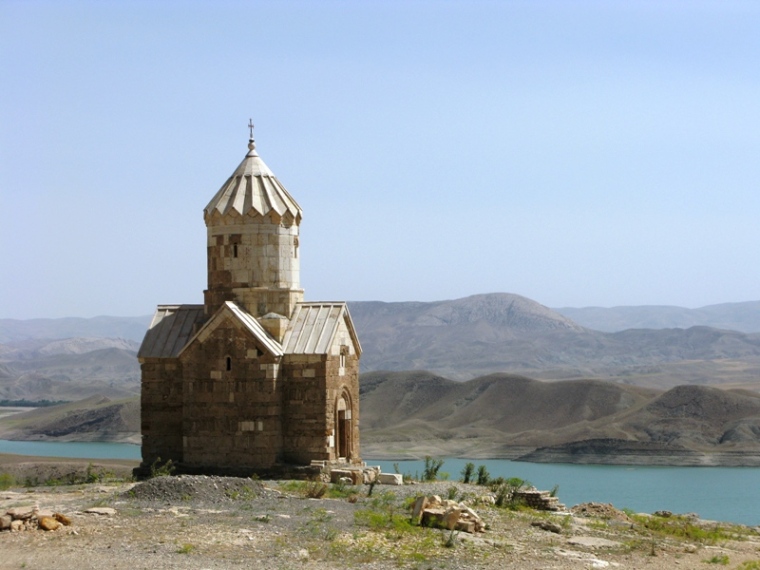Historical churches in Iran vandalized by extremists

International groups have ignored the destruction of a number of historical churches in Iran that was carried out by Islamic extremists, a Christian news outlet has claimed.
According to Mohabat News, many of Iran's roughly 500 historical churches are now abandoned or "on the verge of destruction." Historic sites, including Armenian and evangelical churches, have been vandalized by Islamic extremists in recent years.
The news outlet has criticized UNESCO, the UN agency that recognizes the cultural significance of places across the globe, for overlooking the destruction of the historic sites.
It reported that in 2012, a group of extremists destroyed a historic Christian cemetery that is more that 200 years old. A few years ago, an evangelical church that was designated as a national heritage site in 2005 was also destroyed.
The most recent case reported by the news outlet was the destruction of St. Mary Church in Salmas County in Urumia province in May 2016. A mal-intended group allegedly broke into the church building through the roof and destroyed the cross using sledgehammers and axes. The statues of Mary and the pictures on the wall have been ruined as well.
According to World Magazine, the Iranian government is responsible for confiscation of land owned by non-Muslims, and it has allowed historic Christian sites to fall into disrepair.
In 2013, it was reported that government officials revoked the license of the Doulab cemetery. The land, which was supposed to be a protected cultural site, was said to be in danger of "rotting away" after the officials revoked the license.
"Constructors and investors have cast an eye on this piece of land. There are plans to convert this area into a park. But this cemetery is part of [Iran's] national cultural heritage and is protected," said Siavesh Rastegar, whose grandmother was buried in the cemetery.
The authorities also confiscated the Sharon Gardens, a property belonging to a Protestant community called Jama'at-e Rabbani, after they were accused of espionage. An appeals court upheld the confiscation of the land in December 2016.
"Christians out of fear kept quiet about a lot of church property confiscations in the past," a spokesman named Borji told the International Campaign for Human Rights in Iran. "But confiscating Sharon Gardens is not a simple matter. They can accuse all the other Christian groups of espionage and working for the CIA and take away their properties, too," he continued.
Since 1979, the government has not allowed construction of new religious buildings. Christians have also been banned from conducting services in Farsi and from proselytizing to Muslims.
Iran is ranked on the Open Doors World Watch List as the eighth nation where Christians face the most severe persecution.
 Christians don't have to affirm transgenderism, but they can’t express that view at work: tribunal
Christians don't have to affirm transgenderism, but they can’t express that view at work: tribunal Archaeology discovery: Medieval Christian prayer beads found on Holy Island
Archaeology discovery: Medieval Christian prayer beads found on Holy Island Presbyterian Church in America votes to leave National Association of Evangelicals
Presbyterian Church in America votes to leave National Association of Evangelicals Over 50 killed in 'vile and satanic' attack at Nigerian church on Pentecost Sunday
Over 50 killed in 'vile and satanic' attack at Nigerian church on Pentecost Sunday Ukrainian Orthodox Church severs ties with Moscow over Patriarch Kirill's support for Putin's war
Ukrainian Orthodox Church severs ties with Moscow over Patriarch Kirill's support for Putin's war Islamic State kills 20 Nigerian Christians as revenge for US airstrike
Islamic State kills 20 Nigerian Christians as revenge for US airstrike Man who served 33 years in prison for murder leads inmates to Christ
Man who served 33 years in prison for murder leads inmates to Christ


 Nigerian student beaten to death, body burned over ‘blasphemous’ WhatsApp message
Nigerian student beaten to death, body burned over ‘blasphemous’ WhatsApp message 'A new low': World reacts after Hong Kong arrests 90-year-old Cardinal Joseph Zen
'A new low': World reacts after Hong Kong arrests 90-year-old Cardinal Joseph Zen Iran sentences Christian man to 10 years in prison for hosting house church worship gathering
Iran sentences Christian man to 10 years in prison for hosting house church worship gathering French Guyana: Pastor shot dead, church set on fire after meeting delegation of Evangelicals
French Guyana: Pastor shot dead, church set on fire after meeting delegation of Evangelicals ‘Talking Jesus’ report finds only 6% of UK adults identify as practicing Christians
‘Talking Jesus’ report finds only 6% of UK adults identify as practicing Christians Mission Eurasia ministry center blown up in Ukraine, hundreds of Bibles destroyed: 'God will provide'
Mission Eurasia ministry center blown up in Ukraine, hundreds of Bibles destroyed: 'God will provide' Church holds service for first time after ISIS desecrated it 8 years ago
Church holds service for first time after ISIS desecrated it 8 years ago Burger King apologizes for 'offensive campaign' using Jesus' words at the Last Supper
Burger King apologizes for 'offensive campaign' using Jesus' words at the Last Supper Uganda: Muslims abduct teacher, burn him inside mosque for praying in Christ’s name
Uganda: Muslims abduct teacher, burn him inside mosque for praying in Christ’s name